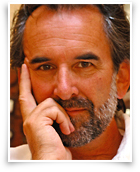
Richard Harvey
connecting psychotherapy and spiritual growth for human awakening
Psychotherapy and Counseling: Thinking and Feeling
the why and how questions
“Thinking the world” sets up a barrier to real experience. Thought then becomes a substitute for experience. What is more helpful than the why question is how, and noticing how, we can already do something about it. What if I limit my experience of emotions to a narrow band that revolves around depression? An awareness practice that helps me begin to feel other less familiar but sometimes more welcome emotions.
The emotional life is not the end all. It is much more complex than that. But to engage with the emotions is a good start because most of the time we have learnt to “think the world”.
Thinking the world sets up a barrier to real experience. When we think something the thought is so powerful that it supplants the thing that is being thought about. Another way of putting it is that we are too busy thinking to have a direct experience of what we are thinking about.
The thought then becomes a substitute for experience. Or we experience the thought only.
So a good first step is to feel. And when we feel what emerges is that we contain our emotions within a narrow band of potential. It is a restriction and it is self-imposed because clearly no one else is doing it!
Why we ask would we restrict our experience of emotional response to such a narrow band of feeling? And this question, while interesting, is really a digression. What is more helpful than the why question is how, and noticing how, we can already do something about it.
For example, if I limit my experience of emotions to a narrow band that revolves around depression; feelings like despair and self-hatred, disgust, self-criticism, judgmental behavior then I may notice how I breathe. I breathe shallowly in my chest and sometimes not at all; I slump in my chair which exacerbates the breathlessness in my chest area; also I breath shallowly in my abdomen; from time to time I take in a deep breath which sounds like a deep sigh; I am reactive and never faraway from explosive emotions; I feel irritated, annoyed and frustrated frequently; sometimes the smallest intrusion or interference sets me off into a tirade of retribution, for I am intensely focused on justice and revenge. I feel miserable often and privately consider what the point of life really is and if there is any at all.
All of the above is the answer to a how rather than the why question. Revealing as it does how I am—how I behave and do not really feel or engage with my emotional life—it becomes apparent how I am not only the victim but also the protagonist of the dynamic. Then in small ways I can begin to change, through paying attention to my breathing for example I can begin to feel less depressed and angry. Then I begin to feel other less familiar but sometimes more welcome emotions.
Share this article
This article was first published in 2011.